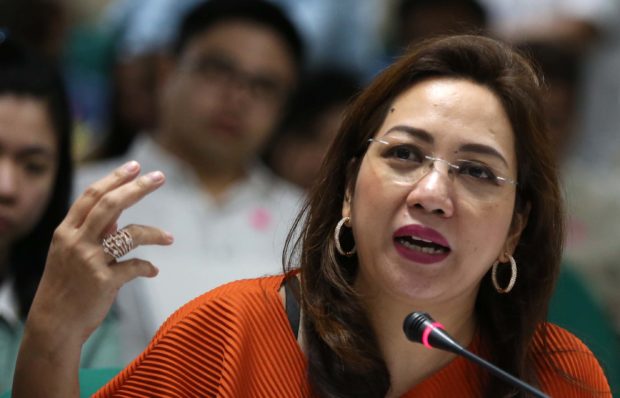Funds for health cut by P10 billion
MANILA, Philippines — Funds for health services in the P4.1-trillion national budget for 2020 that the House of Representatives approved on Friday were slashed by about P10 billion, even as the country is facing a polio epidemic as well as dengue and measles outbreaks that have claimed the lives of more than a thousand people, mostly children.
The P88-billion budget of the Department of Health (DOH) in the 2020 spending bill decreased by P10.6 billion from its 2019 level of P98.6 billion, said Iloilo Rep. Janette Garin.
In the 2020 proposed budget, government subsidies to Philippine Health Insurance Corp. (PhilHealth) and government hospitals have a total allocation of P71.4 billion, a “measly” increase of P545 million from its 2019 funding.
‘String of epidemics’
Opposition lawmakers on Friday slammed the P10-billion cut in the budget for health services amid a “string of epidemics” affecting the country.
Garin, senior minority leader, was dismayed that the House approved the general appropriations bill in record time without allowing amendments to the funding cuts especially for social services.
“How can we then describe the status of the DOH budget under the proposed budget? Quick answer: it seems health is not a priority for those in government who are supposed to display compassion,” she said in a speech delivered after the House passed House Bill No. 4228 in record time.
“Mr. Speaker, needless to say, I am very concerned—as a doctor, as a former health secretary and as a member of this chamber—about the current state of our health care system and the budget that should support it; and as such I would do everything in my power to make sure our people are afforded a just and caring health sector and nothing less,” she said.
Garin said the “massive” budget cut for health came just as the DOH had confirmed the resurgence of the polio virus in the country and as government continued to battle dengue outbreaks in various regions.
High measles incidence
The Philippines, meanwhile, ranked third worldwide with the highest incidence of measles over a 12-month period up to June, with 45,847 cases, according to the World Health Organization.
The DOH said the country’s immunization rate dropped to just 40 percent early this year, much lower than the 95-percent vaccination coverage to prevent measles from spreading.
The health department attributed the decline to the public’s fear of vaccines following the controversy surrounding the use of the antidengue vaccine Dengvaxia.
“Polio has been eradicated in the Philippines since 2000. But because of politics and neglect, we can say that we are back in a state where a disease that should have been prevented is now threatening to return and bring miseries to our beloved people,” Garin said.
The Universal Health Care (UHC) law, which is due for full implementation in 2020, has been allotted P166.5 billion in the 2020 National Expenditure Program, Garin said.
‘Misdeeds’ at PhilHealth
Garin said she was worried about the funding that the PhilHealth will get for the UHC, just as it has been beset with an estimated P29 billion in losses due to fraudulent benefit claims and other “misdeeds” allegedly by its senior health officials.
In addition, PhilHealth will be charging higher premiums on its members under the UHC, Garin said.
“I ask all: How can we make sure that the P67.4 billion will be used properly? What steps are being taken to safeguard this amount and the higher premiums to be collected from direct contributors?” she asked.
Lawmakers belonging to the Makabayan party list bloc, who all voted against the measure, bewailed how the approved 2020 budget ran counter to the Duterte administration’s supposed aim of achieving “peace and progress” for the country.
Senior minority leader Carlos Isagani Zarate of Bayan Muna said that while the administration continued to take in “hefty increases” in its “confidential and intelligence funds,” it had imposed “drastic cuts” on funds for social services.
“The budget for health has been decreasing since 2016. In 2017, the DOH budget was slashed by 20 percent and will continue to decrease by another 7 percent in the coming year,” he said.
Other cuts hit
In Cagayan de Oro City, Misamis Occidental Rep. Diego Ty criticized reductions in the 2020 spending for antipoverty programs from their levels last year.
Ty commended the P19-billion increase in the budget for Pantawid Pamilyang Pilipino Program (4Ps), the conditional cash transfer scheme tied to beneficiary families’ commitment for outcomes in health and education.
Yet Ty also lamented the reduction in resources for training, education and employment generation.
Scholarships, skills
The first-term lawmaker pointed to reductions in allocations for programs of the Technical Education and Skills Development Authority (Tesda), Commission on Higher Education (CHEd), Department of Labor and Employment (Dole) and DOH.
For Tesda, the budget was cut by P1.35 billion, money intended for scholarships and skills-for-employment programs, he said, adding that the cut translates to a loss of some 90,000 skills trainees.
For Dole, the budget was cut by P2.2 billion, intended for cash for work, the Tulong Panghanapbuhay sa Ating Disadvantaged/Displaced Workers and the Government Internship Program (GIP), which is intended to create a competitive workforce among the youth aged 18 to 30.
Since 2011, the GIP has helped more than 25,000 young workers.
The budget cut translates to 22,000 lost employment, according to Ty.
Ty also took issue with the zero funding for the CHEd’s Tulong Dunong, which extends financial aid to students.
Capital outlay
In 2019, the program had P2.6 billion. In 2020, the CHEd’s total allocation was reduced by P11.65 million, Ty noted.
He said the state-owned University of Science and Technology of Southern Philippines in Cagayan de Oro was not provided capital outlay for 2020.
The programs of these agencies, according to Ty, have bearing on addressing the socioeconomic conditions affecting the intended beneficiaries of 4Ps. —With a report from Ryan D. Rosauro
